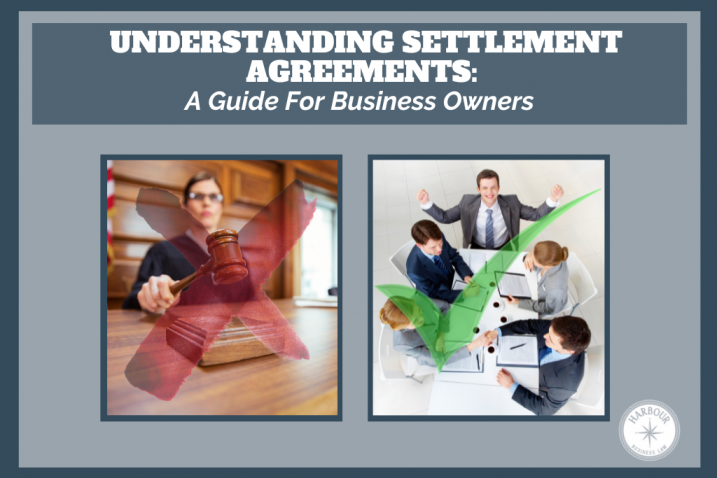April 22, 2024
By: Katelyn J. Dougherty, Esq.
In the business world, disputes are sometimes inevitable. When conflicts arise, settling these disputes efficiently can save time, money, and preserve relationships. One effective way to resolve disputes is through a settlement agreement. In this blog, we’ll explore what settlement agreements are, key terms to include, their benefits, and potential pitfalls to avoid.
What is a Settlement Agreement?
A settlement agreement is a legally binding contract between parties that resolves a dispute without the need for litigation. It outlines the terms under which the parties agree to settle their dispute and usually includes financial compensation, specific actions, or both. This can be a valuable tool for business owners looking to avoid the cost and disruption of litigation.
Key Terms to Include in a Settlement Agreement
- Settlement Amount Clearly specify the amount of money or actions that the parties are agreeing to. This should include details on how and when the payment(s) and/or action will take place.
- Release of Claims A critical component is the release clause, which states that the parties agree to forgo any further claims related to the disputes so long as the settlement agreement is honored. This prevents future litigation on the same issue.
- Confidentiality: Often, parties wish to keep the terms of the settlement and the fact of the settlement confidential. Include a confidentiality clause to protect sensitive information.
- Non-Disparagement This clause prevents parties from making negative statements about each other, which helps in maintaining professional reputations.
- Performance Obligations Outline any actions that each party is required to take as part of the settlement, such as returning property, providing services, or making changes to business practices.
- Dispute Resolution Mechanism Specify how any disputes arising out of the settlement agreement will be resolved, for example through arbitration, mediation, or liquidated damages.
- Legal Fees Decide whether each party will bear its own legal costs or if one party will cover the other’s legal expenses.
- Governing Law and Jurisdiction Indicate which state’s laws will govern the agreement and where any legal proceedings related to the agreement will take place.
Benefits of a Settlement Agreement
- Cost-Effective Settlements often cost less than litigation. They can help avoid extensive legal fees and court costs.
- Time-Saving Reaching a settlement can be much quicker than going through a trial, allowing businesses to return to normal operations sooner.
- Control Parties have more control over the outcome. Instead of leaving the decision to a judge or jury, they negotiate terms that work for both sides.
- Confidentiality Settlements can be kept confidential, protecting the reputations of the parties involved and avoiding public disclosure of sensitive information.
- Preservation of Relationship Settling disputes amicably can help preserve business relationships, which might be valuable in the long term.
Pitfalls of a Settlement Agreement
- Overlooking Important Details If the terms are not thoroughly reviewed, critical issues might be overlooked, leading to future disputes or unintended consequences.
- Lack of Clarity Ambiguities in the agreement can result in disagreements about the interpretation of terms or obligations.
- Enforceability Ensure that the agreement is legally binding and enforceable. If not properly drafted, a settlement agreement may not hold up in court.
- Unintended Consequences Settling might lead to unintended legal or business consequences, especially if the agreement includes overly broad release clauses.
- One-Sided Agreements Be cautious of terms that may disproportionately benefit one party. An imbalance could lead to dissatisfaction or potential future conflicts.
Conclusion
Settlement agreements can be an invaluable tool for resolving disputes and moving forward with minimal disruption. By including clear terms, understanding the benefits, and avoiding common pitfalls, business owners can navigate the settlement process more effectively and maintain a positive business trajectory.
For tailored advice on crafting a settlement agreement that suits your specific situation, consult with a legal professional who can help ensure that your interests are protected.
_____________________________________________________
Don’t have a business attorney? Get in touch with our team by emailing Info@harbourbusinesslaw.com.
_____________________________________________________
This Blog was written by Founding Attorney, Katelyn Dougherty.
DISCLAIMER: This blog is for educational purposes only and does not offer nor substitute legal advice. This blog does not establish an attorney-client relationship and is not for advertising or solicitation purposes. Any of the content contained herein shall not be used to make any decision without first consulting an attorney. The hiring of an attorney is an important decision not to be based on advertisements or blogs. Harbour Business Law expressly disclaims any and all liability in regard to any actions, or lack thereof, based on any contents of this blog.
